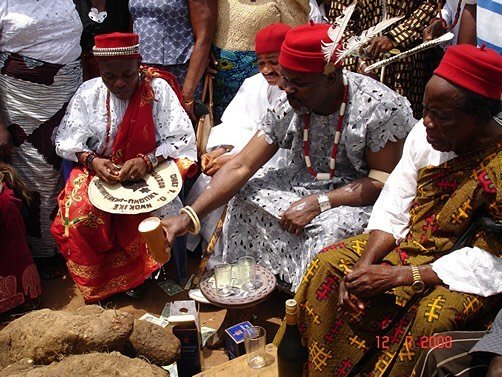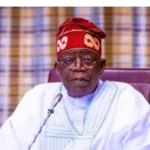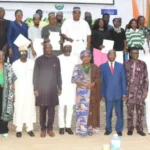Depending on where one is standing, in Nigeria, the name Igbo is a compound word that includes many ethnic groups heaped together by geopolitical contraption. The perception of who constitutes the Igbo varies from place to place and could determine to a large extent, how one is treated outside Igbo land. In the strict sense, the Igbo refer to one of the three major ethnic groups in Nigeria found East of the River Niger, otherwise called the South-East.
But in a broad sense, the Igbo encompases all the ethnic groups in southern Nigeria (if one is in the north), or the ethnic groups found in the defunct Eastern Region of Nigeria (if one is in the South-West). The Igbo cut this image because they are very vibrant and industrious, always conspicuous. In Nigeria’s geopolitical context, the Igbo do not refer only to the Igbo ethnic group. The broad perception of the Igbo is due to misconception rather than hatred. There are over 250 ethnic groups in Nigeria out of which there are three major ethnic groups namely: Hausa, Igbo and Yoruba. This was what most Nigerians were taught in school. Therefore, every Nigerian is seen as either Hausa, Igbo or Yoruba. The other ethnic groups are subsumed under this three.
For instance, to a typical Hausa man in northern Nigeria, the Igbo refer to all non-Hausa speaking people from Southern Nigeria. The Northerners call the Igbo ‘nyamiri’ which is concocted from the Igbo phrase ‘nyem miri’, meaning, ‘give me water’. To a northerner, ‘nyamiri’ refers to everybody from Southern Nigeria, irrespective of the ethnic group. An ordinary Hausa man doesn’t easily distinguish between the Igbo and the rest of the southern Nigeria ethnic groupings. Similarly, the common perception in the South-East is that everybody in the north is Hausa. The Igbo call the entire north ‘Ugwuawusa’ meaning literally ‘the hill country of the Hausa’.
Similarly, an ordinary Yoruba in South-West Nigeria sees all non Yoruba as Igbo, excluding perhaps, the Hausa. Therefore, when the Yoruba says ‘omo Ibo’, he is not just referring to the Igbo-speaking ethnic group in the South-East but all non Yoruba-speaking people, excluding the Hausa. Nevertheless, the Igbo are often at the centre of the discourse because of their early predominance. The Igbo, who bear the ethnic tag, often take exception to any mention of Igbo anywhere, in bad taste. By so doing, the Igbo often bear the brunt of ethnic profiling in Nigeria.
I decided to take a closer look at this issue following the hullabaloo over the recent statement credited to the Oba of Lagos, Alhaji Rilwan Akiolu. The Oba was reported to have threatened the Igbo to vote for Mr. Akinwunmi Ambode, the All Progressives Congress (APC) candidate or be pushed to perish in the lagoon. When that news broke out in the wake of the 2011 elections, the core Igbo of Southeast extraction took it very seriously and made representations to the Oba and other key stakeholders in Lagos. But the Oba’s palace issued a statement that the royal father was misrepresented in the press and pleaded for understanding.
I am not out to analyse the import of the statement but to examine what the Igbo meant in the Oba’s statement. As I said earlier, the Igbo could refer to all non Hausa-speaking people in Southern Nigeria if one is in the north, or to all non-Yoruba-speaking people if one is in the South-West. Therefore, the Igbo in the statement did not refer to Igbo-speaking people in Lagos alone but to all non Yoruba-speaking people. This includes people from the Niger Delta and beyond. How do I know this?
The statement was based on the voting pattern in the March 28 presidential election of that year. The results showed that the states in the defunct Eastern region comprising the South-East and South-South zones, voted overwhelmingly for the incumbent President Goodluck Jonathan.
Here in Lagos, the Peoples Democratic Party (PDP’s) tally was quite overwhelming with 632,327 votes while the APC had 792,460 giving a marginal difference of 160,133 votes. This close tally was attributed to the votes of the Igbo, i.e., non Yoruba-speaking people from the South-East and South-South zones, who favored President Goodluck Jonathan in the presidential election.
Pundits in the South-West have reason to be worried; they reasoned that this was a dangerous development. A situation where the Igbo (non-indigenes) could sway the voting pattern to almost give victory to their opponent was unacceptable. What is at play is geopolitics; no ethnic group wants to be dominated. I’m sure the Igbo don’t want domination either.
Apparently, Oba Akiolu’s outburst was meant to forewarn non indigenes to desist from swimming against the tide in Lagos. Though undemocratic, it bared the mind of a ruler who cherishes the geopolitical integrity of his jurisdiction. How many Igbo traditional rulers care about Igbo being dominated? We need Ezes in the ilk of Oba Akiolu in the South-East. Granted that Nigeria has not developed to the level where ‘non indigenes’ are allowed to dominate the political power in an area other than theirs, our democracy is maturing towards that but not yet. Until we get there, ethnic cleavages still detect who wins and who loses elections.
As expected, the APC candidate, Akinwunmi Ambode won the election; that settled the matter. It is important for the Igbo of South-East zone to understand that whenever the name Igbo is mentioned outside Igbo land in Nigeria, it does not refer only to them but to all non natives of the area. Since the statement was made in Lagos, the Igbo therein, refer to all non Yoruba who voted for the PDP. This includes people from the South-East, South- South, Edo and Delta. The Igbo ethnic group should not assume that they are the only ones being referred to. That would automatically make them the scapegoat.
That was exactly what happened during the Nigeria-Biafra war. Whereas the war was waged against the defunct Eastern Region and part of Mid-West comprising the present South-East, South-South and part of Delta State, the core Igbo ethnic group bore the brunt, to the extent that many saw Biafra as an Igbo project which is totally incorrect. The core Igbo of the South-East should be wise not to take responsibility whenever Igbo is mentioned in Northern Nigeria or in the South-West.
Dr. Onyekakeyah, former member of The Guardian Editorial Board is a Public Affairs Commentator and a Daily Query columnist.
Follow us on all social media platforms @dailyquery for news and analyses around the globe.


























